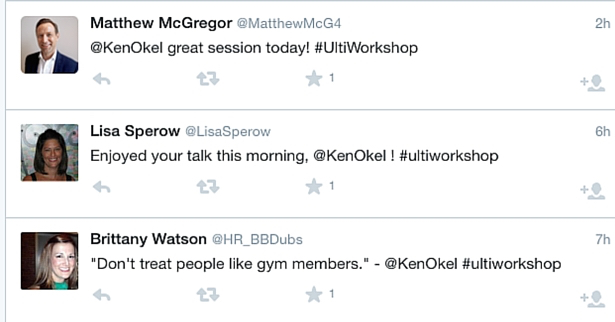 A common communication mistake can frustrate your team and reduce their productivity. It’s done by many leaders, who may not realize they are turning off people very quickly. Ultimately, this undermines their authority. There’s also a good chance their point will be lost.
A common communication mistake can frustrate your team and reduce their productivity. It’s done by many leaders, who may not realize they are turning off people very quickly. Ultimately, this undermines their authority. There’s also a good chance their point will be lost.
The communication mistake happens when a leader asks someone or a group of people a question. The boss is looking for a very specific answer. It’s not a rhetorical question and the answer is subjective. Here’s an example of how it happens:
Leader: “What’s the best way to get more sales?”
Employee #1: “More advertising?”
Leader: “No. What’s the best way to get more sales?”
Employee #2: “Have a great product?”
Leader: “No. What’s the best way to get more sales?”
Employee #3: “Lower prices?”
Leader: “No. The best way to get more sales is to call the customer by his or her first name.”
It’s highly unlikely any of the employees would have guessed this answer. It may have its merits but it could be argued the question has multiple good answers.
Why would a leader make this common communication mistake? Some are attracted to this questioning technique because it:
- Establishes you as the expert.
- Reminds people you’re the boss.
- Sets up your way of thinking as the right way to think.
I’ve found this approach tends to frustrate and alienate an audience. When used repeatedly, they’ll become annoyed with the guessing game. At best, they’ll realize they’re in to a one-way conversation or sermon. At worst, your audience will feel like they’re playing a rigged carnival game.
The leader, who may innocently make this mistake, must realize these problems can emerge:
- Innovation and teamwork goes down. Why would an employee try to think of a new idea, only to be told it’s wrong? Do you want the pressure of being the only person who comes up with new ideas?
- You discount the experiences of your employees, which hurts employee engagement and retention.
- There’s a chance an audience member may give an answer that’s light years better than yours. If you’ve set yourself up as the fountain of truth, you’ll be undermined by the remark.
Why not aim to be the catalyst for productive conversations? Just because you have a better title and paycheck, doesn’t mean you know everything.
How would you react if the same conversation was framed in one of these ways:
- “In my experience, the best way to get more sales is to call the customer by his or her first name.”
- “For many years, I struggled to find a way to sell more. Everything changed when I started to call my customers by their first names.”
- “Calling customers by their first names helped me boost my sales. Let’s talk about this technique.”
In all three scenarios, you’re conveying the same information. You don’t need to use the device of a question and answer session. In fact, you’re making your point much faster and not falling into the trap of a common communication mistake. You’re also leaving the door open for a discussion.
If you’re an effective leader, then you don’t need to resort to cheesy game show host tactics to boost your ego and make your point. If you want people to know your answer to a problem, then don’t get questionable.






